Women of change in restive Kashmir
The women of Kashmir are bruised with agonies inflicted on them by state and non-state actors. The pain and agony they have suffered through decades of old conflict is beyond imagination, but despite this, women are determined to make something out of their difficult lives.
Read also: Blinded in Kashmir: Scores of women injured by India's counter-insurgency crackdown
This story is a tribute to just some of these women of Kashmir who have challenged their current situation and become trendsetters.
Mehvish Zargar: The first female to open a café in Kashmir
At the age of 26, law graduate Mehvish Zargar could have followed her career in what she had studied but instead she chose to become an entrepreneur and open up her very own cafe in the city of Srinagar called Me n U Cafe, making her the first female to do so.
Located in the Bemina area of Srinagar, the trendy looking café is equipped with modern facilities and offers a good ambience for all age groups to hang out at.
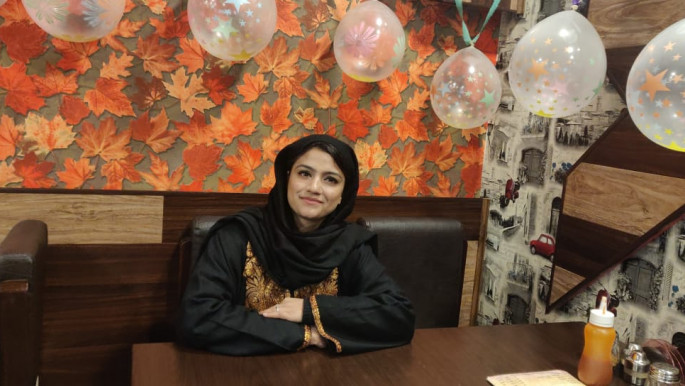 |
|
| Mehvish owns the Me n U Cafe in Srinagar [Nusrat Sidiq] |
Mehvish says her target audience are mainly students since the cafe is located opposite the Government Degree College.
"You can just order just a cup of coffee, sit here for hours… read, write, gossip. Nobody is going to disturb you," she tells The New Arab.
Mehvish believes that women need to come out of their cocoons of fear and face the challenges themselves. "Nobody is going to help you, but yourself," she explains.
But for Mehvish, the journey has not been so smooth. At the age of six, she lost her father to cancer and thereon, she describes life as full of struggles, not for herself but for her mother.
"The spark in her eyes gives me immense satisfaction today whenever people share my success with my mother," she tells The New Arab. "She struggled a lot after my father died, both financially and emotionally. At times my mother would not visit the doctor if she was ill just to save spending money on medicine, and instead spending it on us. But Alhamdulillah, we have defeated the hardships."
While running her cafe, Mehvish is also continuing with her studies, doing an LLM course at Central University of Kashmir. Not only has she she inspired young Kashmiris to realise their passion, but has also given back to people in the place she calls home by creating jobs for others.
Dr Mubeena Ramzan: The first Kashmiri women enlisted as an influential personality in the Muslim world
For educating and empowering women of Kashmir, Dr Mubeena Ramzan became the first Kashmiri woman to be enlisted among the 500 most influential personalities in the Muslim world.
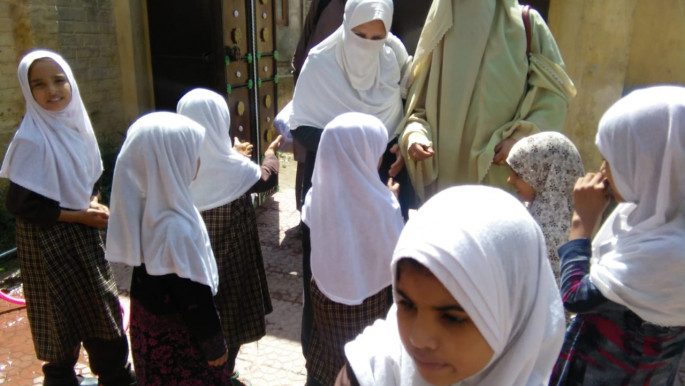 |
|
| Dr Mubeena Ramzan educates and empowers women in Kashmir [Nusrat Sidiq] |
The list was released by The Royal Islamic Strategic Studies Centre, an independent research entity affiliated with the Royal Aal al-Bayt Institute for Islamic thought last year in October.
Dr Mubeena Ramzan educates and empowers women in Kashmir. She runs the Jamia Islamia Mahdul Muslimat, based in Sopore and in Srinagar and also heads a socio-religious organisation, Ansar un Nisa. The former institute graduates aalimahs (religious scholars) whilst the latter provides a helping hand to the needy, would-be brides, widows, orphans and also establishes vocational training centres.
Since her childhood, Dr Ramzan hailing from North Kashmir's Sopore town always wanted to do activism. After availing initial schooling from Islamia High School, Sopore she graduated and did research in Islamic studies with a specialisation in Islamic Law, Jurisprudence (Fiqh) and Orientalism.
Dr Ramzan was well settled with a teaching job but after her research on Kashmiri Society and its evils, she realised that she needs to do something for women.
"I have always wanted to help other women, but the idea of setting up an institute for women came when I was doing my research and realised that I need to something more. The very idea motivated me to quit lectureship in a college in Kupwara and start work on the Jamia Islamia Mahdul Muslimat. It took eight years to purchase a land and build a proper girls-only school there, but we managed it in the end."
Jamia Islamia Mahdul Muslimat is a seminary-style girls only institute where religious scriptures like Quranic exegesis, the science of Hadith, jurisprudence and history, as well as science, maths and English are taught.
The girls are also taught Arabic, English and Urdu and are trained in computers, cutting and designing to help them become competent and self-reliant.
Dr Ramzan not only provides education to women but in 2013 she floated an idea of setting up a women's welfare body which could help all sorts of needy women.
"In 2013, we called a meeting of women from different walks of the life. As a result, in March 2014, we floated a welfare body called Ansar-un-Nissa, which provides a helping hand to the needy, to brides-to-be, widows, orphans, and also establishes vocational training centres."
For Dr Ramzan it was not easy to set up a seminary for women, she was opposed by many religious heads but she kept her will and moved forward.
"I was opposed by a few religious heads for starting a girls only madrassa as they questioned how a woman could run one. But Alhamdulillah, now their perception has changed as we are successfully running three branches."
Dr Ramzan says that for a future better society, it is important to have a very balanced approach where women and men both take care of their roles and responsibilities.
Omaira and Beenish: Two Kashmiri girls reviving crochet art
Craft World Kashmir is an online business venture set up by two creative and vibrant minds – Omaira and Beenish. The two friends came together through a common skill and reintroduced the art of crochet and fabric painting into the Kashmiri society.
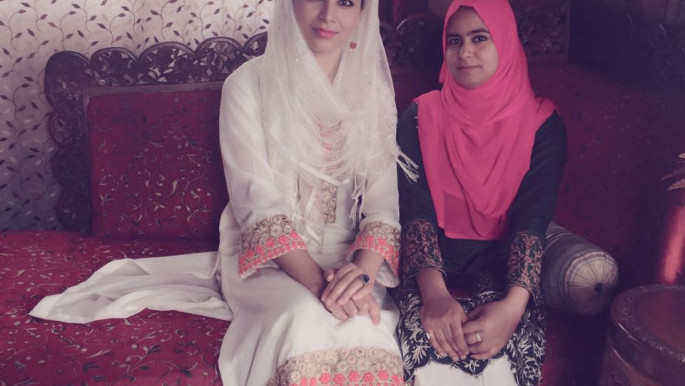 |
|
| Omaira and Beenish set up an online business called Craft World Kashmir [Nusrat Sidiq] |
With their dedication and hardwork, the young women not only revived the crochet art but innovated it. Today, the two are training more than a dozen women, while giving them an opportunity to work and earn a living.
Omaira and Beenish credited their success to immense hard work and the hope to start their own venture that will not only make a way for themselves, but also for others.
"Only my aunt was involved in knitting and she was the one who taught me the main chain of crochet," Beenish tells The New Arab. Curious to learn more, she began watching videos on YouTube and other sites to help develop her skills.
"Later on, Omaira joined and we started using internet to upload our work. The response from people was overwhelming and encouraged us to do more," she adds.
In about four years, they have been able to produce many handmade products including bags, mobile pouches, jewellery, wall hangings, baskets, ponchos, coasters and cushion covers.
The girls also reintroduced Kashmiri jewellery by making it through metallic threads as traditional jewellery is very heavy and expensive.
Beenish and Omaira receive orders online and then start their work at their respective homes with the help and assistance of around dozen women.
"When we started, we were only two, but now we have trained and given work to around 15 women so that they can become self sufficient," Omaira says.
As their whole business is dependent on the internet, the frequent internet gags in Kashmir has left the girls distressed, but they are not ready to give up just yet.
"During the 2017 turmoil, nearly 80 percent of our work was affected due to the internet blockade, but that didn't stop us and today we are our exporting our products worldwide," Omaira added.
With no help from any private or government sector, the two young women have inspired many others.
"We get messages from young girls who proudly flaunt that their mothers or grandmothers know this art too. There were some women who had left knitting but then started again after watching us and got inspired to continue. We feel immense pleasure to bring a good name to this art."
Irtiqa Ayoub: The youngest female rugby coach in Kashmir
Twenty-three-year-old Irtiqa Ayoub, belonging to a hotbed area of Kashmir, is the youngest female rugby coach, training around 40 girls.
"A few years ago, I had no idea what rugby was, or even what the ball looked like. It was only when our coach in school encouraged me to try it out," Irtiqa recalls.
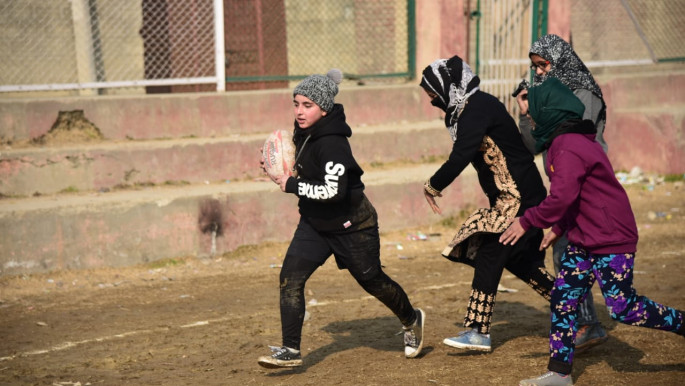 |
|
| Irtiqa has won seven medals playing rugby in tournaments [Nusrat Sidiq] |
While she was always interested in sports – she loved playing football in the narrow alleys of her hometown, Srinagar – Irtiqa was reluctant to try rugby but once she tried, there was no looking back.
"The road was not easy," she explains. "Family reluctance and societal constraints were there for me when I took rugby as a full time sport. When I started playing rugby at the age of 16, there was no awareness among people regarding the sport. People used to pass comments but the perception soon changed when I started winning medals at the state and district level."
Irtiqa has won seven medals at the state level, and seven at the district level. She won a silver medal for Rugby 7's in 2016 and 2017, and a gold medal in 2017. During one of the matches, she broke her nose but that didn't deter her from playing the game.
"I was deeply immersed in the game, such was the passion and honestly after I broke my nose, I didn't feel for it because I had achieved something which was unimaginable for me."
Turmoil and a broken political system has put sports in Kashmir at the backburner. Given the talent Kashmir has, Irtiqa believes Kashmiris could compete anywhere in the world if they were given the chance, but unfortunately the "lackadaisical approach from those responsible are letting many talents go waste."
She adds that in other parts of world, young people are encouraged to take sports, "but here in our part of world when a good and talented player comes forward he/she is shown the door."
Irtiqa recalls how a few years back she was given the chance to play for India but had to let the opportunity go due to the lack of support.
"There is a lot of rugby talent in Kashmir; all we need is support from our families and the government. It's extremely important for parents to not only allow, but also encourage their children, especially girls, to play whichever sport they choose to play," she tells The New Arab.
Masarat Zahra: A young female photojournalist
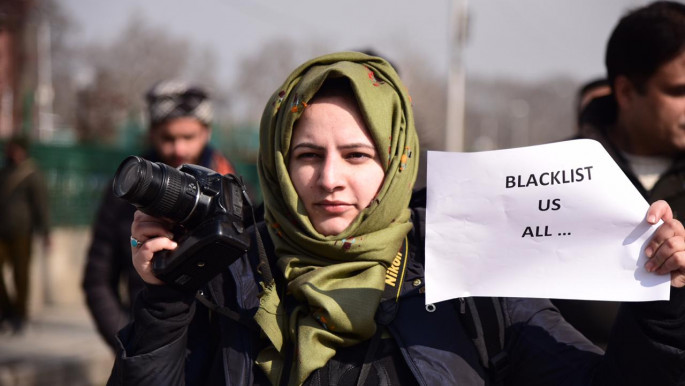 |
|
| Zahra has been covering protests, clashes and gunfights in Kashmir [Nusrat Sidiq] |
Last year Masarat Zahra was accused of a being an "informer" for the army in restive Kashmir when she was covering a gunfight between militants and government forces. However, not only did she shun the rumours, but also shut down the trolls by going back and working in the field the very next day.
"The incident had left me shaken. I was a young photojournalist, that too a female," she tells The New Arab.
"At first I didn't understand how to cope with the situation, I called many people but no one helped on the ground. I also spoke to the photojournalist press association in Srinagar. They said, you are freelancer nobody will stand by you."
Zahra, a young and promising photojournalist, has been covering protests, clashes and gunfights in Kashmir over the last two years, but she says it has not been easy.
"Whenever a female photojournalist covers a protest or an encounter, everybody stares as if women cannot do this job with 'honesty.'"
Journalism has been quite a challenging job in Kashmir, and female journalists, particularly photojournalists, were nowhere in the frame. But new young faces have come into limelight to document stories of pain and agony.
"My work has been published in Getty Images and other reputed photo agencies, but what is annoying is that woman photojournalists are not taken seriously against their male counterparts. The people still discriminate between male and female though both take the same amount of risk while covering incidents," Zahra says.
It is always risky when covering a protest or an encounter and women journalists are not treated any different.
A few years ago in restive Kashmir, there were no female photojournalists covering protests or encounters. Now photojournalists like Zahra are changing the trend, but support from journalistic associations as well as from the government is badly needed.
"We need support from media and journalistic associations, then only we can stand strong in the profession, otherwise the way journalists are treated here in this conflict torn state is unimaginable," Zahra explains.
She explains that there is no recognition for women photojournalists and even freelancers like her have to go through a lot trouble to report from ground zero.
"This is where Journalistic Associations can play a great role but unfortunately that is missing," Zahra rued.
The challenges are there but Zahra says she wants to bring female perspective to the conflict. "It is important," she says. "And that is why more women should come up."
Nusrat Sidiq is a legal and human rights reporter working for Kashmir Reader. Her articles have also been published in Asian Times and Indian Water Portal.



